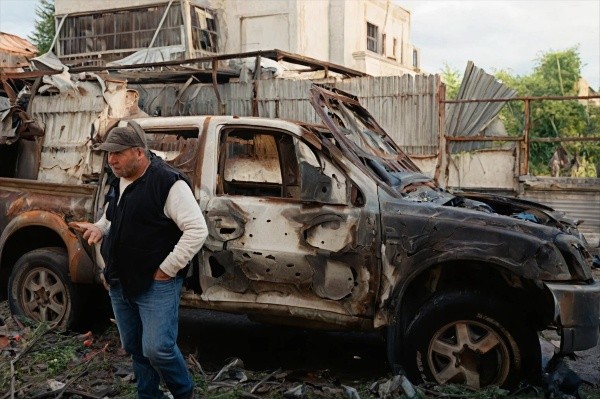Iran’s Plan to Strike Back Against the U.S.
Iran’s Military Preparations Following U.S. Attacks
Loading...

Hezbollah targets Israeli military sites after Israel killed 20 in a strike in central Beirut as EU top diplomat calls for ceasefire.
Hezbollah's Bold Offensive
In a significant escalation of hostilities, Hezbollah has launched 340 missiles at various targets in Israel, including the Ashdod naval base and military sites in Tel Aviv. This marks a notable intensification in the ongoing conflict, particularly as Hezbollah claims it conducted these operations using advanced missiles and strike drones. The Israeli military reported that air raid sirens were activated in central and northern regions, including the suburbs of Tel Aviv, as they intercepted several projectiles aimed at northern Israel.
The barrage of missiles resulted in injuries to at least 11 individuals, with one man reported to be in a "moderate to serious" condition. This attack follows a deadly Israeli airstrike in central Beirut that killed 29 people and wounded 66 others, according to Lebanon’s Ministry of Public Health.
Political Reactions and Calls for Ceasefire
Lebanon's caretaker Prime Minister, Najib Mikati, condemned the Israeli strikes, labeling them as a blatant assault on ongoing ceasefire efforts led by the United States. He described the Israeli actions as a "direct, bloody message" that undermines diplomatic efforts to end the conflict. Mikati's statement emphasized that Israel's military actions are a rejection of proposed solutions to the crisis.
In response to the escalating violence, Josep Borrell, the European Union's top diplomat, urged both Israel and Hezbollah to pursue a ceasefire. He highlighted the need for immediate action and the full implementation of United Nations Security Council Resolution 1701, which aims to stabilize the region following the 2006 war. Borrell also announced that the EU is prepared to allocate 200 million euros to support the Lebanese military, which would help bolster security in southern Lebanon.
Continued Violence and Casualties
The conflict has seen a tragic toll on both sides. In southern Lebanon, an Israeli strike on a Lebanese army post resulted in the death of one soldier and injuries to 18 others, some critically. This incident is part of a broader pattern of Israeli attacks that have reportedly killed over 40 Lebanese troops since the conflict escalated. The Israeli military has maintained that these strikes on Lebanese forces are accidental and not part of their campaign against Hezbollah.
Since the beginning of this conflict, Israeli airstrikes have resulted in the deaths of more than 3,500 people in Lebanon, displacing approximately 1.2 million individuals, which constitutes about a quarter of the Lebanese population. On the Israeli side, around 90 soldiers and nearly 50 civilians have lost their lives due to bombardments and subsequent battles following Israel's ground invasion in early October.
The Path Forward
As the situation continues to deteriorate, the Biden administration has been actively working to broker a ceasefire, with U.S. envoy Amos Hochstein returning to the region last week to facilitate discussions. The potential for a ceasefire remains uncertain, but the international community is increasingly calling for a resolution to the violence that has engulfed both Lebanon and Israel.
The ongoing conflict not only poses a humanitarian crisis but also threatens to destabilize the region further, making diplomatic efforts more crucial than ever. As both sides prepare for potential further escalations, the hope for peace hangs in the balance.
Editor
Iran’s Military Preparations Following U.S. Attacks
Troops remain in five strategic locations, raising fears of renewed tensions and long-term occupation.
Opposition forces have taken control of the capital after a significant offensive. Here is how it unravelled.
